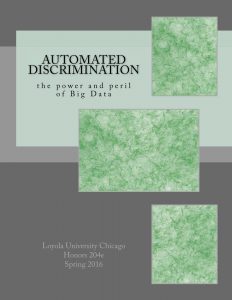- June 19, 2017
- 10:00 am
- Fady Harfoush
- no comments
Big Data for Social Justice
To kick-off summer, the CME Group Business Analytics Lab provided mentoring and professional guidance to students who participated in the First Year Research Experience (FYRE). Undergraduate, graduate and Loyola faculty spent three weeks conducting research and experiments on various topics ranging from app development to genome sequencing research. Kajal Chokshi, currently a Research & Development (R&D) intern at the CME lab helped with the mentoring effort.
Kajal is the first summer R&D intern at the CME Lab. She is a recent graduate from Loyola’s Class of 2017, with a B.S. degree in both Mathematics and Statistics. While a student at Loyola, she competed in the Fairness and Analytics competition and won a fellowship for her predictive model that suggested unequal pay between various genders and age groups. Additionally, her team won the best use of external data at Loyola’s Annual DataFest Competition by creating an interactive map that overlayed travel bookings and individual socioeconomic levels and highlighted a marketing strategy to Expedia’s team. Her interests have centered on data analysis and computer science for social justice. Research and mentoring in Mathematics and Statistics have also been a focus for Kajal through her four years at Loyola, so has education in STEM subjects. Kajal aspires to obtain her PhD in Statistics with a focus on Predictive Analytics where she hopes to continue conducting research. Eventually, she would like to work in a classroom setting focusing on stats education at the university level. The work at CME Group Business Analytics Lab will ultimately help Kajal in reaching her goals.
Through the fellowship awarded to her from the Fairness and Analytics Competition, she is tasked to edit and enhance an internal publication on big data, in addition to mentoring the FYRE students and interning at the CME Group this summer. As the race to convert streaming big data into actionable business insights grows, it’s important to analyze the ethics behind it all.
Society is just starting to realize how “Big Data” has the potential to influence all aspects of life. The tendrils of big data stretch even further with the advent of ubiquitous data collection (GPS, inertial sensors, always-on microphones and video, massive archiving), nearly unlimited data storage and access to easily scalable, and massively distributed computing power. It’s easy to draw inferences, for better or for worse, from the vast amounts of data collected every day.
To address some of these issues students from Loyola University Chicago Spring 2016 Honors 204E course compiled different essays in a first draft book titled “Automated Discrimination: The Perils and Power of Big Data”. As part of the fellowship award, Kajal along with Computer Science graduate student Neha Goel, will be reviewing, editing, and completing the preliminary work done by the honors students for its final publication. The compilation of essays aims to teach the reader about the powers of Big Data and consider also the dangers of its abuse. Kajal and Neha delve deep into how big data can be used to discriminate against legally-protected and other unfairly selected groups as a side effect of making decisions based on seemingly innocuous information including zip code, automated resume analytics, or even keystroke timing while filling online forms. Each student in the Honors course contributed to the book which focused on the history of big data, followed by the laws in place to regulate big data use, and the ethics and policies in state. The goal is to raise awareness of the dangers of unchecked Big Data use and to provide a resource written in simple language and intelligible manner for people with little or no experience in the field.
The book serves as a good source of information to engage discussions in addressing fundamental issues surrounding discriminatory policies and practices, and bring to light additional concerns on the use of big data. The final book version will be published by the end of the summer.
